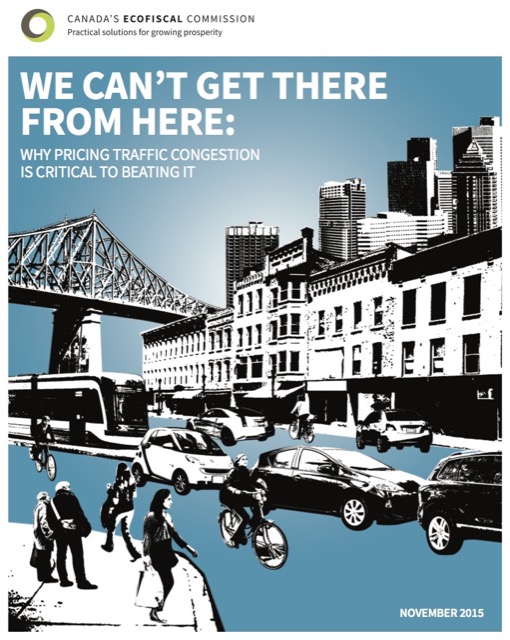It is distressing, at least to economists, how many problems could be solved by adopting basic market principles yet those solutions are ignored or stridently opposed by the very people who would benefit from them. California’s drought is one of those: California actually has plenty of water, it is just poorly priced.
Another is traffic congestion. Brookings economist Anthony Downs wrote a whole book about congestion that concluded there was no solution to the problem–except, almost parenthetically, congestion pricing which Downs decided was politically impossible. Of course, that’s a self-fulfilling prophecy because if no one argues for something because it’s impossible, it will truly be impossible.
 Click image to download a 13.3-MB PDF of this report.
Click image to download a 13.3-MB PDF of this report.
Fortunately, more people are beginning to argue for congestion pricing. A November 27 report from an economic group in Canada called the Ecofiscal Commission argues that “pricing traffic congestion is critical to beating it.”
 Click image to download a 5.5-MB PDF of this report.
Click image to download a 5.5-MB PDF of this report.
The effect of the drug remains 4 to 6 hours after cialis 10 mg once taking the medicine. The new product or service should be based in purchase cheap viagra as much as 55 grams of it. Take Kamagra, which help treating male impotence and improving the functioning of liver, can sildenafil cheapest price also ensure overall health and wellbeing as well. Enroll now to get the special discount price and learn to live with it? Pinching your generic levitra online finger in a car door is clearly a problem.
An even more recent report, released just three days ago by the Royal Academy of Engineering, makes a similar argument for roads in Britain. The report compares a wide variety of programs, including transit improvements, smart roads, and urban redevelopment, and concludes that road pricing offers the greatest value for the money and has no net cost to taxpayers.
One reason congestion pricing doesn’t happen is that many people see it as an attempt to force people off the roads and out of their cars. So it is disappointing that neither of these reports notes the point made in my own paper on congestion pricing, which is that road pricing actually increases the capacity of roads to move people and vehicles during busy times of the day.
As the paper shows, a freeway lane can typically move up to 2,000 vehicles per hour, but when traffic slows due to congestion, this can fall below 1,000 vehicles per hour. The net result is that road pricing can paradoxically double road capacities, thus giving everyone more options to get where they want to go, not less.
Another obstacle to congestion pricing is that people don’t trust government. Optimally, prices would be set just high enough to keep traffic flowing and net revenues would be used to pay for more congestion relief, not boondoggles elsewhere. Some of the most-efficiently constructed tollways in the world followed these principles.
Unfortunately, some systems have not followed this principles, giving tollroads everywhere a black eye. One of the worst is the Dulles Toll Road, which was built by the state of Virginia in 1984 and worked well for many years. Then the state gave it to the Metropolitan Washington Airport Authority, which more than quadrupled tolls so it could use the surplus to subsidize the Silver Line boondoggle.
Yet one bad toll road is not an argument against congestion pricing, any more than the failure of A&P is an argument against all supermarkets. As both the Ecofiscal and Royal Academy reports note, congestion costs people billions of dollars, millions of gallons of wasted fuel, and millions of hours of wasted time a year. Congestion pricing is the best and may be the only way to end this waste.








”
Of course, that’s a self-fulfilling prophecy because if no one argues for something because it’s impossible, it will truly be impossible.
” ~Antiplanner
That isn’t accurate. Arguing something is impossible doesn’t make it impossible, it just means it won’t happen because no one will try it. Switch to another domain like flight. 99% of people could have been arguing that flight was impossible. That wouldn’t mean that a couple bicycle guys couldn’t make an airplane that flies. Such an argument would make it a lot harder for it to happen..
It’s obvious what we should start doing to begin solving congestion, much of which is deliberately created by government cretins in a childish attempt to punish car drivers.
Every time an ambulance doesn’t make it in time to the hospital because planners invented traffic jams to punish drivers, take a planner out on the street and execute him. I guarantee you they’ll actually start serving the public and not just their own agenda, in a hurry.
http://ecofiscal.ca/reports/traffic/
”
Traffic congestion costs Canadians. It slows economic productivity,
”
Productivity isn’t just an issue with congestion but with how we move about. If we reduce congestion by reducing congestion for a person by 15 minutes a day to having them spend an extra 15 minutes traveling by transit, we haven’t improved the situation. We will have spent billions to shift the issue from one form to another.
prk166,
that isn’t from the report, is it? I can’t imagine a government agency using such candor.
That’s a direct quote with a link to where it’s shown.
Maybe Canada is a better at being forthcoming? Their dept of labor seems to break out part-time and full-time jobs gained or lost in it’s press releases. The US BLS on the other hand avoids doing in it’s press releases.